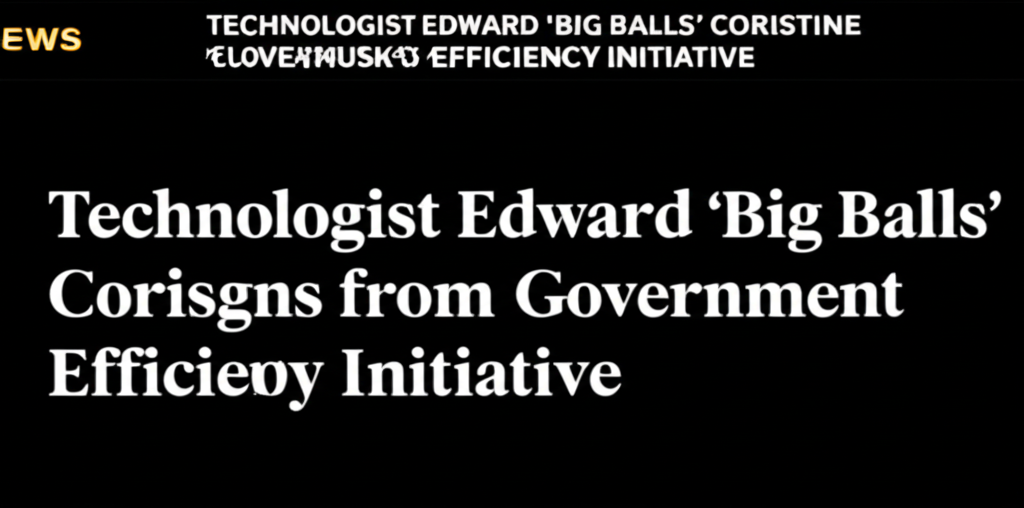The Unexpected Departure of 'Big Balls' from Government Efficiency Efforts
In a development that underscores the volatile nature of bringing disruptive tech talent into the staid world of federal bureaucracy, Edward Coristine, a technologist known by the provocative online handle "Big Balls," has resigned from his position within the US government. Coristine was a key operative in the ambitious, and often controversial, Department of Government Efficiency (DOGE), an initiative closely associated with tech mogul Elon Musk.
The White House confirmed Coristine's resignation, stating simply, "Edward Coristine resigned yesterday." This announcement marks the exit of one of the first technologists brought into the DOGE fold, a group tasked with identifying and implementing efficiencies across federal agencies.
Coristine's tenure, though relatively brief, was notable. He had only recently transitioned to full-time employment status at the General Services Administration (GSA) late the previous month, a move that had been reported by WIRED. As of the day following his resignation, his official GSA Google Workspace account was inactive, and his name had been removed from an internal White House contact list of current DOGE employees on the federal payroll.
Who Was Edward 'Big Balls' Coristine in the Context of DOGE?
Edward Coristine's path into the US government was unconventional, mirroring the nature of the DOGE initiative itself. At just 19 years old, and a high school graduate, his professional background included a brief stint at Neuralink, another of Elon Musk's ventures. More notably, he founded a company called Tesla.Sexy LLC in 2021, which reportedly owns several domain names, including some registered in Russia. One of these domains is associated with an AI Discord bot. His history also includes working for the Path Network, a company founded by individuals with past ties to blackhat hacking, and a Telegram handle linked to Coristine had reportedly solicited a distributed denial of service (DDoS) attack.
It was this online history and the handle "Big Balls" that first drew public and media attention when his involvement with DOGE became known. While the initiative sought individuals with unconventional skills and a willingness to challenge norms, Coristine's background and online persona raised questions about vetting processes and the appropriateness of such figures in sensitive government roles. WIRED previously detailed Coristine's background, including his online handle and past ventures, highlighting the stark contrast between his digital footprint and his government position.
Within DOGE, Coristine was considered part of a small, trusted group of technologists. These individuals were reportedly deployed across multiple federal agencies, often equipped with multiple government-issued laptops – a detail that, according to former DOGE member Sahil Lavingia, was a point of jest among the core group of engineers.
His activities within DOGE were wide-ranging. In the months leading up to his resignation, Coristine was reportedly attending regular meetings with various government departments and agencies. These included discussions with the Commerce Department regarding Trump's golden Visa program, meetings focused on implementing the DOGE agenda within the military, and consultations with the Treasury Department. He was also listed on a GSA workforce report.
Physically, Coristine was occasionally seen at GSA headquarters in Washington, DC, working from a section of the sixth floor designated for DOGE-affiliated staff and agency leadership. This physical presence, coupled with his reported access and involvement in high-level discussions, underscored his integral, albeit brief, role in the initiative.
The Department of Government Efficiency: Ambition Meets Controversy
The Department of Government Efficiency, or DOGE as it came to be known, was an initiative born from the desire to dramatically streamline and modernize the federal government. Closely aligned with Elon Musk, the project aimed to apply principles of technological disruption and efficiency, often associated with the private sector, to the complex and often slow-moving machinery of government bureaucracy. The stated goal was to dismantle large, inefficient parts of the federal structure and improve operational effectiveness.
However, DOGE was not without its critics and controversies. The initiative's methods and objectives raised concerns among traditional government officials and watchdogs. Reports emerged detailing DOGE's efforts to gain direct access to sensitive federal payment systems and its work to join siloed data systems. While proponents argued this was necessary for efficiency, critics voiced alarm over potential privacy implications and the concentration of data, particularly regarding the stated aim to enable surveillance of people in the US.
The composition of the DOGE team also drew scrutiny. Bringing in individuals from outside the traditional government hiring pipeline, especially those with unconventional backgrounds or controversial online presences like Coristine, challenged established norms and raised questions about security vetting and suitability for public service.
The initiative's close association with Elon Musk, a figure known for his outspoken nature and significant influence in the tech world, added another layer of complexity. Musk's vision and leadership were central to DOGE, but his eventual exit from a formal government capacity signaled a potential turning point for the project.
Timing and Implications: Following the Leaders Out?
Edward Coristine's resignation comes on the heels of other significant departures from the DOGE initiative. Elon Musk himself exited government in an official capacity the previous month. Shortly thereafter, Musk's top lieutenant within DOGE, Steve Davis, who is also the president of The Boring Company (another Musk venture), also announced his departure. WIRED previously reported on Davis's exit and the uncertainty it created regarding leadership within DOGE.
The timing of Coristine's resignation, following these high-profile exits, raises questions about the future viability and direction of the Department of Government Efficiency. With the key figures who championed and led the initiative now gone, the project's momentum and political capital may be significantly diminished.
Former DOGE member Sahil Lavingia, who WIRED first identified working at the Department of Veterans' Affairs as part of the initiative, commented on the situation, suggesting that the departures of Musk and Davis could trigger further exits. "I have heard since Elon and Steve have supposedly departed, they’ve terminated a lot of those that got hired," Lavingia stated. He pointed out that many of the DOGE hires were still within their two-year probationary period, making them potentially vulnerable to termination.
Coristine's relatively recent conversion to full-time status, while seemingly providing more stability, still fell within this probationary window. His resignation, rather than termination, suggests a voluntary decision, but it nonetheless contributes to the perception of instability and potential winding down of the DOGE effort.
The departure of individuals like Coristine, who were part of the core group of trusted technologists deployed across multiple agencies, could significantly impact ongoing DOGE projects. These technologists were the hands-on implementers of the initiative's goals, and their exit could leave gaps in expertise and continuity within the agencies they were embedded in.
The Broader Context: Technologists in Government
The saga of Edward Coristine and the Department of Government Efficiency is part of a larger, ongoing narrative about the role of technology and technologists in modernizing government. For years, there have been calls to bridge the gap between the fast-paced, innovative world of Silicon Valley and the often slow, risk-averse environment of federal agencies.
Initiatives like the US Digital Service and Presidential Innovation Fellows have sought to bring in tech talent for limited tours of duty, aiming to inject new skills and perspectives into government IT projects and digital services. These programs have had successes, but also faced challenges related to integrating external cultures, navigating bureaucratic hurdles, and retaining talent.
DOGE, with its direct ties to a prominent tech figure like Elon Musk and its more aggressive approach to systemic change, represented a different model. It aimed for more fundamental disruption rather than incremental improvement. However, the controversies surrounding its personnel, methods, and transparency highlight the potential pitfalls of such an approach.
The case of Edward Coristine, with his youth, unconventional background, and controversial online history, brings into sharp focus the challenges of vetting and integrating talent from outside traditional government pipelines. While the tech world often values disruption and unconventional paths, these traits can clash with the requirements for trust, security, and public confidence essential for government roles.
The use of online handles like "Big Balls" also raises questions about professional conduct and public perception for individuals holding government positions, even those brought in specifically to challenge norms. While such handles might be common or even celebrated in certain online communities, they can be jarring and inappropriate in the context of public service.
The experience of DOGE, culminating in the departures of key figures like Musk, Davis, and now Coristine, provides valuable lessons for future efforts to bring external expertise into government. It underscores the need for clear objectives, transparent processes, robust vetting, and a careful consideration of how external cultures and norms integrate with the unique demands of public service.
Looking Ahead: The Future of Government Efficiency Efforts
With the architects and key implementers of the Department of Government Efficiency initiative stepping away, the future of DOGE itself appears uncertain. While some projects or ideas initiated under its banner might continue within individual agencies, the centralized, high-profile effort driven by Musk and his team seems to be losing steam rapidly.
The potential termination of probationary staff, as suggested by Sahil Lavingia, could further dismantle the team assembled under DOGE. This raises concerns about the fate of ongoing projects and the potential loss of institutional knowledge gained during the initiative's operation.
The episode also leaves a complex legacy. On one hand, it highlighted the potential for applying innovative thinking and technological solutions to government problems. On the other hand, it exposed significant challenges related to governance, transparency, personnel suitability, and the integration of external talent.
The resignation of Edward Coristine, a figure who embodied both the unconventional nature of DOGE and some of the controversies surrounding it, serves as a poignant moment in this narrative. His departure, alongside those of Musk and Davis, marks a significant turning point for an initiative that promised radical efficiency but ultimately faced considerable hurdles in navigating the realities of government.
As the government continues to grapple with the need for modernization and efficiency in the digital age, the lessons learned from the rise and apparent decline of the Department of Government Efficiency, and the experiences of individuals like Edward Coristine, will undoubtedly inform future efforts. The challenge remains finding effective ways to harness external expertise and technological innovation while upholding the principles of transparency, accountability, and public trust essential for effective governance.

The story of 'Big Balls' in government may have concluded with a resignation, but the broader conversation about how best to integrate dynamic, external talent into the public sector is far from over. It requires a careful balancing act between embracing innovation and adhering to the fundamental principles that underpin public service.
